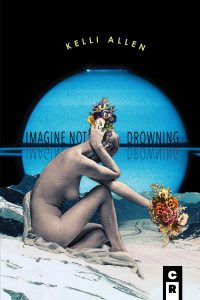 Imagine Not Drowning by Kelli Allen
Imagine Not Drowning by Kelli Allen
C&R Press
January 2017
978-1-936196-68-5
“Hands,” “mouth,” “time,” “body.” “Fingers, skin, story, touch.” “Come close.” “Know me.” These words appear most frequently in Kelli Allen’s Imagine Not Drowning. They quickly assert the book’s concerns. See me watching you. Listen to me speak. Help me make this shared experience meaningful. And indeed, it is the touches we exchange – physical, intellectual, emotional – that again and again come under close scrutiny in these beautiful poems.
Allen begins by inquiring in “Becoming a Woman of the Brook, Shade, and Moss”:
What if my body fell through bliss,
caught its last small toe on some hook
in descent? How, then, will we name
wherever is left
This is the first of the many paradoxes in the book. Our smallest toes are on the agenda – the parts of ourselves we may have overlooked. But as to others, as the speaker of “Eleven Years, Abandon Another Day” declares, “I teach you again not to vanish”. This lesson isn’t always applicable, and we find ourselves pondering grief’s role in our self-definition. Scientists have confirmed that traumatic experiences affect our brains more strongly, are remembered more reliably. They become part of us not only metaphorically, but biologically. “You wear your body as grief,” Allen suggests in “This is the center of disappear,” reminding us that we are our own repositories of meaning and continuity. And in a way, it’s our job to fashion grief into a tool for growth as the speaker of “Sorrow’s Argument” asserts,
On the day before we learn to distrust it, grief is welcome.
It soaks us with heavy wet gratitude in being able to feel
anything at all. We take grief down into our throats and hold
it thick just above our bellies. The not quite fullness reminds us
of the way back up and through, past our lips, is breath and, eventually,
song. There are four words for this: waiting, resistance, sigh, alchemy.
Love and loss, longing and attention, waiting and alchemy, investment and survival – these are the stakes at play in this book, no less than in all of life. But what of song? Is it simultaneously a metaphor for life itself, for life’s best expression, in the particular expression offered in “Seduction is the Lightening from this Season into Next”:
Imagine Not Drowning? I dedicate all my anguish, all my devastations
to whatever you might sing next.
Allen often revisits the notion of singing, perhaps struggling to grasp it herself – and thus opening up a delightful investigative space between circumstance and intention, between the Other and one’s own path – as the narrator seems to inhabit and embody both a fulfilling relationship and its breakdown, both optimism and despair. We are reminded that as much as we think of ourselves as self-contained units of meaning, the more substantial meaning is derived from encountering others as Allen writes
There is pressure between my hand and the reaching. We ask
longing to become a city for us, but what do we say
when the windows blow inward instead of out
and the streets flood again and again? If I am the length
of this want, and you are the width of some container
as we build up and out, how can we hope to plant grass
near the temple which will be, of course, the center of it all?
(“Edging Our Wall, Untying”)
The question one might ask: does the reaching invite the hand? Are we preconditioned to extend ourselves into the ambiguous territories of interaction? The speaker in these poems has little choice – she comes to the world with the engaged feature already on. And yet, “There is no end/to my hands covering your eyes,” the poet explains in “Sometimes, as we move closer to Autumn” – an astute metaphor for how we live, knowing and not knowing, wanting answers and hiding from them, not always privy to our own inner logic. In the appropriately titled “Philosophy Tramples Everything, No Apologies,” Allen’s speaker declares:
Today, there are pears in our basket
and though I do not know what to do with my mouth,
I can watch yours make sense of this story.
In the end, the poet generously leaves us the opportunity to connect the dots, to decide for ourselves what this multifaceted message is about. We refuse to grow and then the encounter forces us to do so; we see and become affected, we hear and are rendered vulnerable. We want to be noticed. Imagine Not Drowning reclaims one’s existential role, one’s right to mean something, to make a difference. There are four words for this collection: insightful, inspired, electric, powerful.
A. Molotkov was born in Russia and moved to the US in 1990, switching to writing in English in 1993. His poetry collection, The Catalog of Broken Things, is just out from Airlie Press. Published or accepted by Kenyon, Iowa, Cincinnati, Massachusetts, Atlanta, Tampa, Raleigh, New Orleans and Cider Press Reviews, Pif, Ruminate, 2 River and many more, Molotkov is winner of various fiction and poetry contests and a 2015 Oregon Literary Fellowship. He co-edits The Inflectionist Review. Learn more about him at amolotkov.com.